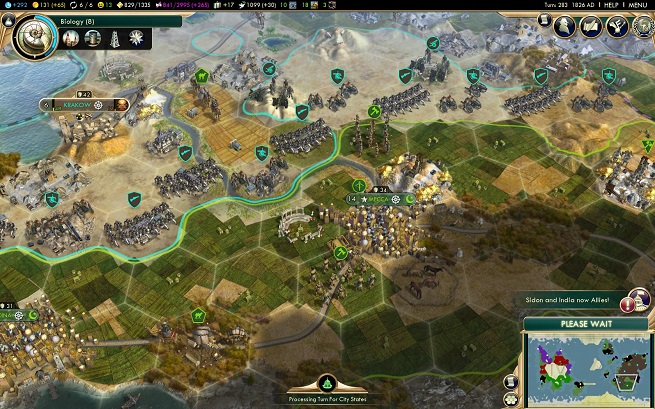I’ve been resistant to the metaphor, but I cannot deny it any longer: Firaxis Games’ Civilization V, the latest iteration in the studio’s longest running and most popular PC strategy series, is a game mostly about filling up buckets, then emptying those buckets, collecting a prize, and taking back a slightly larger bucket to fill up again.
Firaxis’ newest expansion, Brave New World, only serves to underscore this cycle. It adds trade routes, which are just another way to fill up the gold bucket. It changes the culture victory condition from filling up social policy buckets to filling up tourism buckets. It adds nine new civilizations, which all have new ways to fill up the same old buckets.
And Civ V still doesn’t have much for you to do while you’re waiting for those buckets to fill. At times, I’d end my turn, waiting for my next chance to issue new orders or build additional city structures or select another technology to research. And I’d stare at the screen, waiting for these prompts … only to realize minutes later that I’d been looking at another “next turn” button.
What You’ll Like
The World Congress adds to diplomacy
The one new addition that breaks up the monotony is the World Congress. This is where you can propose global resolutions, such as a trade embargo against a rival civilization or city-state (which eliminates any existing connected trade routes), a ban on a luxury resource (which cuts off any happiness benefit), or a tax on military units (which increases maintenance costs).

Above: The World Congress.
The Congress plays well into diplomacy, too, where other leaders have their own preferences. Your proposal and voting decisions can have long-term effects on your relationships with other civilizations. You can also try to sway your rivals to vote your way through traditional negotiation before the ballots are cast.
Diplomacy is still a little wonky. In one game, I made a promise to the Zulu to join their war plans against Egypt in 10 turns. After amassing my forces at the Egyptian border, Ramesses II asked what my armies were doing. I lied, saying they were just passing through because I didn’t want to jump-start the fight without the Zulu. Guess who held a grudge against me for that? Yes, the Zulu. (What the … ?) But the World Congress at least adds some extra flavor to these otherwise vanilla interactions.
What You Won’t Like
Civ V is still fundamentally broken
It’s telling that I wrote the above subhead before going back to look at my review of the last expansion, Gods and Kings, which has a nearly identical introduction to that game’s “What You Won’t Like” section. Just as I wrote then, the heart of Civ V makes for a terribly uninteresting strategy game, and the new additions, once again, at best don’t address the problem at all and at worst exasperate the issue.

Above: Even the A.I. knows that a city surrounded by ice and without any resources provides a net gold and science gain in Civ V.
The new trade routes allow you to gather easy gold. Sometimes, you’ll also earn science or religious influence, depending on where you’re sending your caravans or cargo ships. By making it easier to earn gold, Firaxis has made buying the allegiance of city-states easier, which bestow all kinds of bonuses — most important of which are food and happiness. And with that, trade routes make it easier you to rather conveniently avoid the only growth limiter in the game: a negative civilization-wide happiness rating.
None of the other additions — not the new civilizations you can play nor the ideologies sandwiched into the revamped social policy system nor the archeological digs you can uncover — do anything to fix this fundamental flaw in the design. I’m convinced now that not even Firaxis (this being the studio’s second attempt) can correct the mistake of using happiness as the only growth limiter. It’s just far too easy to keep your nation content, and thus, it’s again always in your interest to spam as many cities as possible.
Firaxis’ only ideas are to make this strategy more difficult to employ, such as requiring the player to make a declaration of friendship in order to trade for lump sums of gold, which is one of the easiest ways to quickly buy up city-states. That tactic is no different from how the studio has approached the problem before, like when Firaxis increased the minimum distance between founded cities and decreased the amount of lump sum gold another nation would accept for a luxury resource. All Firaxis seems to have up its sleeve are Band-Aids.

